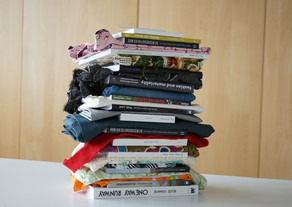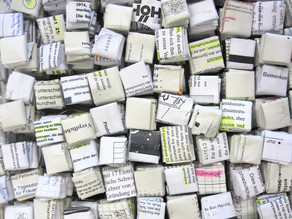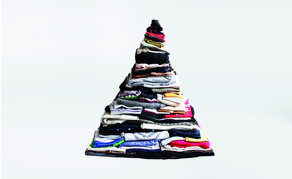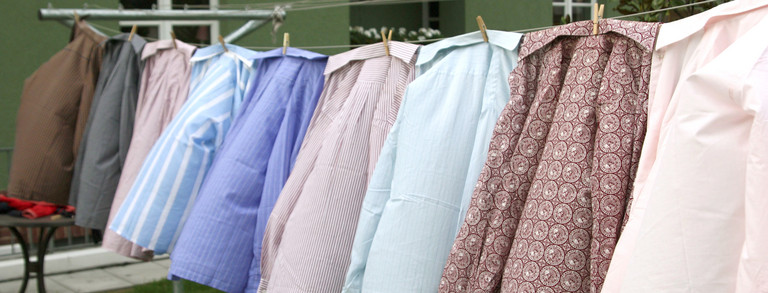Dr. Andrei Zavadski, M.A.
Wissenschaftlicher Mitarbeiter
Institut für Kunst und Materielle Kultur
Emil-Figge-Str. 50
D-44227 Dortmund
Raum 5.244
Tel. +49 (0)231-755-4979
Sekretariat: +49 (0)231-755-2974
Fax +49 (0)231-755-6238 (Sekretariat)
E-Mail
Sprechstunden in der vorlesungsfreien Zeit:
Kontaktaufnahme per E-Mail
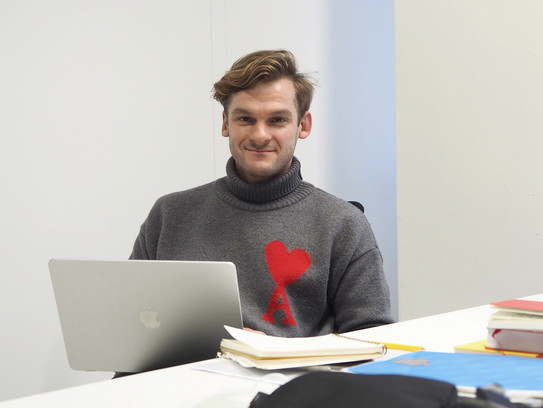
Kurzbiografie
Kurzbiografie
Dr. Andrei Zavadski studierte Public History und Memory Studies an der Moscow School of Social and Economic Sciences und an der Manchester University (MA, 2014) und Kommunikationswisschenschaft an der Freien Universität Berlin (Promotion zum Thema „Mnemonische Gegenöffentlichkeiten: Wie das politische Regime in Russland durch Erinnerungen an die neunziger Jahre herausgefordert wird“, 2020). Er arbeitete am Institut für Publizistik- und Kommunikationswissenschaft der FU Berlin und im Centre for Anthropological Research on Museums and Heritage (CARMAH), Institut für Europäische Ethnologie / Hermann von Helmholtz-Zentrum für Kulturtechnik der Humboldt-Universität zu Berlin. Er ist Mitbegründer von Bildungs- und Forschungsinitiativen wie The February Journal, einer interdisziplinären akademischen Publikation mit Review-Verfahren, und Public History Laboratory, einem unabhängigen Kollektiv, das den Dialog zwischen Akademikern und Praktikern im Bereich der Geschichte fördert. Er ist Mitglied der Memory Studies Association, ICOM Deutschland, VG Wort und der International Federation for Public History (IFPH).
Seit Oktober 2022 ist Andrei Zavadski Wissenschaftlicher Mitarbeiter am Institut für Kunst und Materielle Kultur der TU Dortmund.
Schwerpunkte in Forschung und Lehre
Geschichtspolitik, Public History, Memory Studies und Erinnerungspraktiken, Erinnerung an Proteste, Museen und Vergangenheiten, Partizipation in Museen, Repräsentationen von Geschichte in den Medien und Digital Memories, Osteuropa, postsozialistische Gegenwarten
Dr. Andrei Zavadski studierte Anglistik und interkulturelle Kommunikation an der Minsker Staatlichen Linguistischen Universität, internationale Beziehungen und Arabistik an der MGIMO-Universität in Moskau (BA, 2009), Public History und Memory Studies an der Moscow School of Social and Economic Sciences und an der Manchester University (MA, 2014) und Kommunikationswisschenschaft an der Freien Universität Berlin (Promotion zum Thema „Mnemonische Gegenöffentlichkeiten: Wie das politische Regime in Russland durch Erinnerungen an die neunziger Jahre herausgefordert wird“, 2020).
Andrei Zavadski arbeitete am Institut für Publizistik- und Kommunikationswissenschaft der FU Berlin und im Centre for Anthropological Research on Museums and Heritage (CARMAH), Institut für Europäische Ethnologie / Hermann von Helmholtz-Zentrum für Kulturtechnik der Humboldt-Universität zu Berlin. Er ist Mitbegründer von Bildungs- und Forschungsinitiativen wie The February Journal, einer interdisziplinären akademischen Publikation mit Review-Verfahren, und Public History Laboratory, einem unabhängigen Kollektiv, das den Dialog zwischen Akademikern und Praktikern im Bereich der Geschichte fördert.
September 2025 COST Action Short-Term Scientific Mission Grant, ‘Trace as a Research Agenda for Climate Change, Technology Studies, and Social Justice’ (TRACTS), Goldsmiths, University of London, United Kingdom.
Mai 2025 Co-funding support of the project ‘People with HIV in Photographs of Valery Khristoforov and Jürgen Baldiga’ (with Katerina Suverina), Zukunftskolleg, University of Konstanz, Germany.
Mai 2024 DAAD-Stipendium für Kongressreisen.
September 2022 Fellowship des Leibniz-Forschungsverbunds „Wert der Vergangenheit“, Leibniz-Zentrum für Zeithistorische Forschung (ZZF), Universität Potsdam.
Juli 2022 (erhalten, aber nicht in Anspruch genommen) Global Encounters Fellowship (12 Monate), die Exzellenzstrategie an der Eberhard-Karls-Universität Tübingen.
2021 — 2024 Constructive Advanced Thinking (CAT) grant, Network of European Institutes for Advanced Study (NetIAS). Für das Project ‘Reconstituting Publics through Remembering Transitions: Facilitating Critical Engagement with the 1980–90s on Local and Transnational Scales’ (PI Ksenia Robbe).
6.-8. Juni 2024 Mitorganisator des von Joachim Baur, Sharon Macdonald (HU Berlin/inherit. Heritage in Transformation) und Philipp Schorch (LMU München) konzipierten Forschungsworkshops ‘Museums - Contacts - Knowledges’, HU Berlin.
21.-23. März 2024 Mitorganisator der von Joachim Baur und Nora Sternfeld konzipierten Konferenz ‘Das radikaldemokratische Museum revisited’ im Dortmunder U (Dortmund, Deutschland). > zur Konferenz-Website
12. Juli 2022 Mitveranstalter der Panels ‘Dialogic Memories of the 1970-90s “Transitions” across the World: Current Practices and Possible Solidarities,’ Memory Studies Association (MSA) Week of Virtual Events.
24.–25. September 2021 Ko-Kurator der 8th Garage International Conference ‘Utopias of (Non)Knowledge: The Museum as a Research Hub’ (Moskau, Russland).
19.–21. Juni 2019 Mitveranstalter des Workshops ‘Theorizing Publics under Authoritarian Rule,’ Freie Universität Berlin (Berlin, Deutschland).
3.–4. Juni 2016 Mitveranstalter der Konferenz des Public History Laboratory ‘The Past Is a Foreign Country? Public History in Russia,’ Higher School of Economics (Moskau, Russland).
15.–17. Juni 2017 Mitveranstalter der Konferenz des Public History Laboratory ‘Public History in Russia: Museums for the Past or the Past for Museums?’, Garage Museum of Contemporary Art (Moskau, Russland).
3.–4. November 2018 Mitveranstalter der Konferenz des Public History Laboratory ‘Public History in Russia: Performances of the Past in the Theatre and Beyond,’ Smena Centre for Contemporary Culture (Kazan, Russland).
17.–20. November 2015 Mitveranstalter der ‘Tweeting the War: Social Media and War Coverage in the Ukrainian Conflict,’ Freie Universität Berlin (Berlin, Deutschland).
1.–7. Dezember 2014 Mitveranstalter der School for Young Researchers ‘Lessons of the 20th Century: Memory of Totalitarianism in Museums, Memorials, Archives and Mass Media in Russia and Germany’ (Perm, Russland).
11.–12. April 2014 Mitveranstalter der XIII International Conference of Young Scholars ‘Development Vectors of Modern Russia: From Forming Values to Inventing Traditions,’ Moscow School of Social and Economic Sciences (Moskau, Russland).
Robbe K, Zavadski A & Mrozik A (2025) Dialogic remembering as method: Activating relationality in memories of postsocialist “transitions”. Memory Studies, online first (open access).
Zavadski A & Hilden I (2025) „Das ist viel Arbeit, viel Zeit, viel Arbeit“. Friktionen und Spannungen in der partizipativen Museumspraxis. In: Daniela Döring & Margarete Vöhringer (Hg.) Friktionen | Kuratieren. Für eine politische Wissensgeschichte des Ausstellens, 285–298. transcript Verlag.
Zavadski, Andrei, Macdonald, Sharon & Hilden, Irene (2024) Postsocialist, postmigrant, and postcolonial dynamics in Germany’s changing memoryscape: introduction. Berliner Blätter, 89: 3–23.
Hilden, Irene & Zavadski, Andrei (2024) Museum participation as labor. Curator: The Museum Journal, online first (open access): 1-20.
Robbe, Ksenia & Zavadski, Andrei (2024/2023) ‘C’mon, turn Swan Lake on’: Memories of the 1990s at the Belarusian protests of 2020. Digital Icons: Studies in Russian, Eurasian and Central European New Media, 22: 115–141. A special issue on the 2020 Belarusian protests, ed. by Almira Ousmanova and Robert Zalesky. See also a summary of the article on the NYU Jordan Center Blog.
Zavadski, Andrei (2023) Remembering the 1990s in Russia as a form of political protest: Mnemonic counterpublics. In: Ksenia Robbe (ed), Remembering Transitions: Local Revisions and Global Crossings in Culture and Media (pp. 183–204). Berlin, De Gruyter.
Zavadski, Andrei & Hilden, Irene (2023) The Museum as a choir. Visitor reactions to the multivocality at the Humboldt Forum’s ‘Berlin Global’ exhibition. Museum and Society, 21(3): 57–77.
Zavadski, Andrei et al. (2022) Public history in Russia: The past, the present, and (thoughts about) the future. International Public History, 5(2): 143–156.
Zavadski, Andrei & Dubina, Vera (2023/2021) Eclipsing Stalin: The GULAG History Museum in Moscow as a manifestation of Russia’s official memory of Soviet repression. Problems of Post-Communism, 70(5): 531–543.
Litvinenko, Anna & Zavadski, Andrei (2020) Memories on demand: Narratives about 1917 in Russia’s online publics. EuropeAsia Studies, 72(10): 1657-1677. DOI: 10.1080/09668136.2020.1791801.
Zavadski, Andrei & Toepfl, Florian (2019 [2018]) Querying the Internet as a mnemonic practice: How search engines mediate four types of past events in Russia. Media, Culture & Society, 41(1): 21–37. DOI: 10.1177/0163443718764565.
Herausgegebene Sammlungen und Sonderausgaben
Macdonald, Sharon; Hilden, Irene & Zavadski, Andrei (eds) Germany's Changing Memoryscape. Postsocialist, Postmigrant, and Postcolonial Dynamics (special issue). Berliner Blätter 89: 1–134.
Dogadaeva S & Zavadski A (eds) (2024) Decolonizing the Self: How Do We Perceive Others When We Practice Autotheory? (Special Issue) The February Journal, 03: 1–166.
Gavrilova, Sofia & Zavadski, Andrei (eds) (2023) Stalin’s Terror, the Gulag, and Soviet Repression in Russia’s Museums (Special Issue). Problems of Post-Communism, 70(5).
Dogadaeva, Shura & Zavadski, Andrei (eds) (2023) On Behalf of Silence, Seeking Sanctuary (Special Issue). The February Journal, 01-02: 1–310.
Zavadski A & Dubina V (eds) (2021) Vse v proshlom: teoriya i praktika publichnoi istorii [All Things Past: Theory and Practice of Public History]. Moscow, Novoe izdatelstvo. (See also Makhotina, Katja. Zavadski, Andrei, Dubina, Vera: Vse v proshlom: teoriya i praktika publichnoi istorii [All Things Past: Theory and Practice of Public History]. International Public History, 6(1): 73–74.)
Zavadski A, Sklez V & Suverina E (eds) (2019) Politika affekta: Muzei kak prostranstvo publichnoi istorii [Politics of Affect: The Museum as a Public History Space]. Moscow, Novoe Literaturnoe Obozrenie.
Auf Russisch
Zavadski A (2021) Memory studies [a chapter on the differences and similarities between memory studies and public history as disciplines]. In: Zavadski A & Dubina V (eds), Vse v proshlom: teoriya i praktika publichnoi istorii [All Things Past: Theory and Practice of Public History], pp. 337–353. Moscow, Novoe izdatelstvo.
Zavadski A (2019) ‘Pamiat' na steroidakh’: memory studies i novaya ekologiya nauchnoi zhizni. Letnyaya shkola ‘Mnemonics 2018: Ekologii pamiati (Lyovenskiy katolichskiy universitet, Belgiya, 22-24 avgusta 2018 g.’ [‘Memory on steroids’: Memory studies and a new ecology of academic life. Summer school ‘Mnemonics 2018: Ecologies of Memory’ (KU Leuven, Belgium, August 22-24, 2018)]. Novoe Literaturnoe Obozrenie, 2 (156).
Zavadski A, Isaev E, Kravchenko A, Sklez V, & Suverina E (2017) Publichnaia istoriia: mezhdu akademicheskim issledovaniem i praktikoi [Public History: Between academic research and practice],’ Neprikosnovennyi zapas, 112 (2).
Giesen A, Zavadski A, & Kravchenko A (2016) Mezhdu rabskim trudom i sotsialisticheskim stroitel'stvom. Zametki o tom, kak v ekspozitsiiakh nekotorykh rossiiskikh muzeev reprezentirovan trud zaklyuchennykh Gulaga [Between Slave Labor and Building Socialism: Notes on How the Labor of Gulag Prisoners is Represented in Certain Russian Museum Exhibitions], Novoe Literaturnoe Obozrenie. Special issue ‘Rabstvo kak intellektual'noie naslediie i kul'turnaia pamiat’ [Slavery as Intellectual Legacy and Cultural Memory], 142 (II).
Zavadski A (2015) Pis’ma iz lageria kak sposob sokhranit’ sebia: sluchai khudozhnika Grigoriia Filippovskogo [Letters from the Gulag as a survival technique: A case of the artist Grigorii Filippovskii]. Laboratorium: Journal of Social Research, 1: 147–157.
Zavadski A (2015). Nam nuzhna svoia Assman [We Need Our Own Aleida Assmann]: Review of the book ‘Dlinnaia ten’ proshlogo: Memorial’naia kul’tura i istoricheskaia politika [The Long Shadow of the Past: Memory, Culture and Memory Politics]’ by Aleida Assmann, Zhurnal issledovanii sotsial'noi politiki [The Journal of Social Policy Studies], 3(13): 501–508.
Blog-Beiträge
Zavadski, Andrei (2023, February 2) Public history in Russia and its failed struggle against Putin's historical politics. De Gruyter Conversations, https://blog.degruyter.com/public-history-in-russia-and-its-failed-struggle-against-putins-historical-politics/
Zavadski A & Hilden I (2022, April 7) Participatory countermonuments of colonial violence. CARMAH Reflections, https://carmah.berlin/reflections/participatory-countermonuments-of-colonial-violence/
Hilden I, Merrow H & Zavadski A (2021, February 2) Present imperfect, future intense: The opening of the Humboldt Forum. CARMAH Reflections, https://carmah.berlin/reflections/present-imperfect-future-intense/
‘Reconstituting Publics through Remembering Transitions: Facilitating Critical Engagement with the 1980–90s on Local and Transnational Scales’
Three decades after the radical transformations of the USSR and its satellites began in the 1980s–1990s, the topic of ‘transitioning’ from socialist states to liberal democracies remains highly contentious in Central and Eastern Europe. Over the last decade, the transitional past has been increasingly instrumentalized, by national-populist actors and in the counter-memories of their opponents. In the context of heated contestations of memory, with high political stakes, spaces for dialogue are rapidly shrinking and public spheres are becoming increasingly ‘disconnected.’
The project addresses this societal issue by engaging with memory practices of the ‘transitional period’ beyond the polarized versions. Drawing on approaches of cultural analysis of discourse and affect, critical memory studies, public history, (digital) ethnography, and intersectional study of gender and generations, we aim to develop strategies for facilitating more cohesive and at the same time more critical practices of remembering that have the potential to lead to dialogue and form reflective communities. The comparative approach will allow for developing strategies and policies on a transnational (European) level based on trans-local resonances rather than top-down scripts.
Team members: Ksenia Robbe (Principal Investigator), Senior Lecturer at the Faculty of Arts at the University of Groningen; Agnieszka Mrozik, Assistant Professor at the Institute of Literary Research of the Polish Academy of Sciences; Andrei Zavadski, Post-doctoral Researcher at the Center for Anthropological Research on Museums and Heritage, Humboldt-Universität zu Berlin; Nora Korte, ‘Transition Dialogue’ / Austausch e.V. (Berlin).
The project is part of the Constructive Advanced Thinking (CAT) programme – an initiative of 12 European Institutes for Advanced Study and coordinated by the IAS CEU in 2021/22.
Relevant links
Institute for Advanced Study, Central European University (LATEST UPDATES)
Video interview for the Institut d'études avancées de Paris (IEA de Paris)
Events as part of the project
European Solidarity Centre, Gdańsk:
Wokół filmu „Kryształ” w reż. Daryi Zhuk. 30.09.22
Co znaczy dla ciebie przełom lat 80. i 90. XX wieku? Warsztaty. 01.10.2022
Humboldt Labor/Humboldt Forum, Berlin:
‘Crystal Swan: Film und Gespräch zu Wendezeiten in Belarus und Deutschland’, 05.05.2023
‘Was bedeutet Ihnen die Wendezeit der 1980er und 1990er Jahre? Workshop für und mit Berliner*innen’, 06.05.2023
Central Museum of Textiles, Łódź:
’Białoruś w latach 90. XX wieku a polskie doświadczenie transformacji. Wokół filmu Kryształ w reż. Daryi Zhuk’, 13.10.2023
’Co znaczy dla Ciebie przełom lat 80. i 90. XX wieku? Przypomnijmy sobie razem czasy transformacji. Warsztaty z udziałem mieszkańców i mieszkanek Łodzi’, 14.10.2023
Museum Utopie und Alltag/Museum of Utopia and Everyday Life, Eisenhüttenstadt:
‘Crystal Swan – Film und Gespräch zur „Wendezeit“ in Belarus und Ostdeutschland,’ 24.05.2024
‘Wie hast Du die Nachwendezeit und die 1990er Jahre in Eisenhüttenstadt erlebt?’, 25.05.2024


